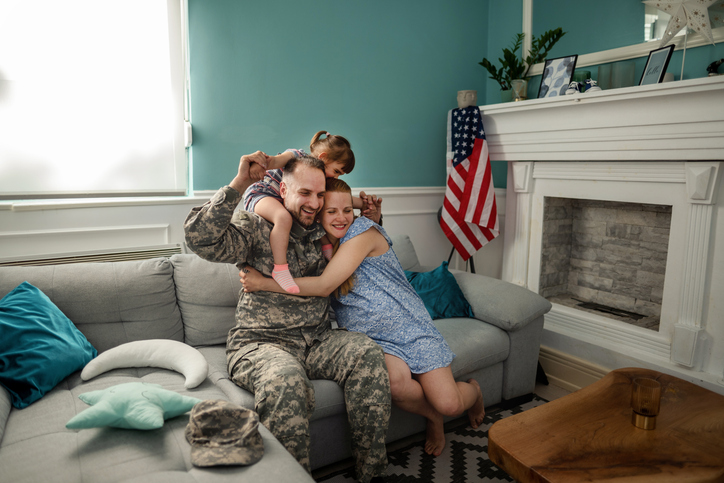
Transitioning back to civilian life presents a unique set of challenges for veterans. These individuals, who have dedicated years to serving their country, often find the shift fraught with expected and unforeseen obstacles. Challenges they face usually include finding employment, readjusting to civilian culture, and maintaining relationships with loved ones. In some cases, veterans transition from military to civilian life successfully but, due to unforeseen circumstances, become homeless. Access to stable housing for veterans is one of the most significant barriers to a successful transition.
Housing instability and homelessness are pervasive issues among veterans. According to the 2022 data from the National Alliance to End Homelessness, 582,462 people were experiencing homelessness, with approximately 6% of all homeless adults being veterans. This alarming statistic highlights the need for stable housing resources tailored to veterans’ needs.
The predominant culture of the military is that of regiment, structure, and order. There is an inherent sense of purpose and belonging within the greater community of fellow service members- cohesive symbiosis motivating participants to push their standards of focus, determination, and individual discipline for the realization of a common goal (mission). This is where stable housing plays a crucial role.
The process of moving from military to civilian life is complex and multifaceted. Veterans must navigate a new identity, reestablish family roles, and adapt to a civilian workforce, all while missing the camaraderie and structure of military life. In this sea of change, stable housing is an anchor, providing a sense of security and normalcy amidst the upheaval. It allows veterans to focus on other aspects of their transition without the added stress and uncertainty of not having a stable place to live.
Moreover, stable housing is essential in addressing other challenges veterans face. For example, homelessness often co-occurs with mental health issues and substance abuse disorders, both of which are prevalent among veterans. Providing stable housing can facilitate access to and participation in mental health and substance abuse treatment, promoting their overall well-being.
According to an article by VA News, veteran homelessness increased by 7.4% in 2023, with 15,507 veterans experiencing homelessness. This increase is a reminder of the ongoing struggles faced by veterans in finding stable housing and the need for continued support and resources.
The stark reality is that a significant number of veterans find themselves without a home after their service.
These veterans face an uphill battle, with the instability of homelessness amplifying the challenges of reintegration. Lack of a stable residence makes it difficult to secure employment, access healthcare, and reconnect with community resources, further entrenching the cycle of instability. Additionally, the experience of homelessness can lead to social isolation and feelings of shame and worthlessness, negatively impacting their mental health.
Furthermore, homeless veterans are at a higher risk of experiencing adverse outcomes such as substance abuse, physical health problems, and involvement in the criminal justice system. These challenges impact the individual veteran and have broader consequences for society.
The psychological benefits of stable housing cannot be overstated. For many veterans, a secure and consistent living situation is pivotal in managing and recovering from mental health issues like PTSD and depression. Stable housing provides a safe environment for healing and growth, offering veterans the mental space to process their experiences and plan for the future. It also allows them to establish a support network and connect with other veterans, strengthening their sense of community and belonging.
A stable address is often a prerequisite for job hunting and educational opportunities. Employers and academic institutions require consistent contact information and a sense of reliability, which homelessness jeopardizes.
Success stories abound of veterans who, once housed, leveraged their stable situation to pursue employment and education, laying the groundwork for a fulfilling civilian life. One veteran who gained housing learned how to lead a healthy and productive life. Another veteran used transitional housing as a stepping stone to getting her apartment.
Stable housing provides a platform for veterans to build upon, allowing them to focus on their goals and aspirations.
Community Support and Resources
Community programs and non-profit organizations are vital in bridging the gap between homelessness and stable housing for veterans. At Veterans Place of Washington Boulevard, we offer targeted support, including:
These programs provide the practical support necessary for securing stable housing and offer a sense of community and belonging, mirroring the camaraderie of military life. Additionally, these resources assist veterans in addressing other challenges they may face, such as mental health issues or substance abuse disorders.
Stable housing facilitates reintegration into the community by providing a foundation for veterans to build upon. It allows them to establish a sense of belonging within their community, increasing social connections and engagement. This can positively impact mental health, self-esteem, and overall well-being. Having a home helps veterans rebuild social networks and engage with community activities, fostering a sense of belonging and support.
Donate to End Veteran Homelessness Today
The path from military to civilian life is challenging, but stable housing stands out as a fundamental building block for successful reintegration. It’s more than just shelter; it provides security, supports mental health, enables employment and education, and fosters community connections. As we consider the sacrifices veterans have made, it becomes clear that ensuring they have access to stable housing is not just beneficial but essential.
We can all play a part in supporting these heroes. By advocating for, supporting, or donating to housing initiatives like the Transitional Housing at Veterans Place of Washington Boulevard, we contribute to a foundation that can transform the lives of veterans and facilitate their successful reintegration into civilian life. Together, we can make a difference. Donate today to help end veteran homelessness!